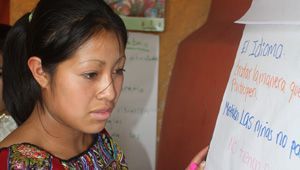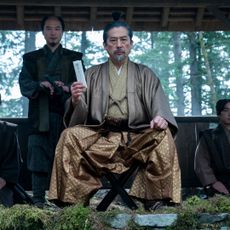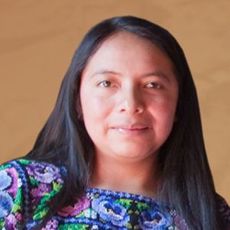
Odunola Ojewumi is the Marie Claire and United Nations Population Fund winner of the fourth annual Americans for UNFPA Student Award for the Health and Dignity of Women. Ola, a sophomore from the University of Maryland College Park, is blogging directly from her weeklong visit to Guatemala.
The past few days have been hectic, consisting of early morning meetings and late nights spent writing this blog. I find myself reaching for more coffee instead of orange juice to boost my energy. Being tired is worth it, though, because learning how UNFPA and the women of Guatemala are empowering their adolescent girls has strengthened my mind, body, and soul.
This morning I attended a briefing with Anna Luisa Riva, who is UNFPA Guatemala's Assistant Representative. Ms. Riva explained that UNFPA's work can be analyzed in three parts or pillars, which include: sexual and reproductive health, gender equality, and population and development. My hands were glued to my notepad — I couldn't stop writing about the many UNFPA success stories. At the core of all pillars, UNFPA's work enables women to find strength and courage within themselves, by giving them the tools to advocate for their own rights. According to Riva, "Our role is to support [women]. We see our work through what they do." At that point, I couldn't have been more proud to be a student ambassador for Americans for UNFPA.
UNFPA supports women by working with key stakeholders to improve policies, programs, and health care. For example, they work with the President's Secretariat to Women and the Ministries of Health & Education to fund programs to educate women about their rights. They focus on political empowerment to increase women's political participation. The need for more advocates made sense to me especially after learning that of the 158 members of Congress in Guatemala, only 19 are women.
UNFPA also funds special projects that support women, which are often administered by other non-profits. I had the opportunity to visit one today: El Centro de Investigación, Capacitación y Apoyo a la Mujer (CICAM). CICAM is an organization that works on the prevention and treatment of violence against women. I was invited to sit in on a group therapy workshop.
If I had not known in advance that it was a therapy session, I would have easily mistaken the session for a book club or a staff meeting. The women were seated in a semi-circle and a dynamic speaker led the discussion using PowerPoint and flip charts to navigate the discussion! Many of the women in the room had been victims of violence and were learning about valuing themselves and understanding their rights.
"The situation [for women] has changed now because they have written laws," Iris Alvarado, a CICAM social worker, explained. "The challenge now, is enforcing it. My work is to let them know how to go and ask for their rights."
Stay In The Know
Marie Claire email subscribers get intel on fashion and beauty trends, hot-off-the-press celebrity news, and more. Sign up here.
Alvarado's statement resonated with me because it showed the clear correlation between advocacy, empowerment, and change.
The work being done on the ground is only just beginning. With more women in Congress, and more activists speaking out, women will be able to reach their full potential. The women that I met at CICAM represent the countless numbers of women who are touched directly by organizations like UNFPA. We must stand in unity and continue to advocate on behalf of their empowerment. Do not let their struggle end with these words. Support women, support sustainability, support UNFPA, and tell Congress to support them, too, by taking action at Americans for UNFPA's action center.
Read all of Ola's blog posts:
Seeking Inspiration from Maryland to Guatemala City
Exhausted in Antigua, the Land of Eternal Spring
Meeting the Guatemalan Girls of Abriendo Oportunidades
-
 21 Spring Essentials in Madewell, Banana Republic, and Shopbop's Flash Sales
21 Spring Essentials in Madewell, Banana Republic, and Shopbop's Flash SalesDon’t let these can’t-miss sales pass you by.
By Brooke Knappenberger Published
-
 'Shōgun' Is a Masterpiece—Will There Be More Episodes?
'Shōgun' Is a Masterpiece—Will There Be More Episodes?With those ratings, never say never.
By Quinci LeGardye Published
-
 32 Child Stars Who Have Aged Like Fine Wine
32 Child Stars Who Have Aged Like Fine WineThey made the notoriously bumpy transition to adulthood look easy.
By Katherine J. Igoe Published
-
 The Tables Have Turned: Uber Now Lets Your Driver Give *You* Feedback
The Tables Have Turned: Uber Now Lets Your Driver Give *You* FeedbackGetting a 5-star rating isn't as easy as it looks.
By Chanel Vargas Published
-
This Airline Made Female Interviewees Take Pregnancy Tests
WTF!
By Lillian Min Published
-
There's an Even Bigger Airline Crisis Brewing
Inside the illegal discrimination plaguing an already plagued industry.
By Jimmy Im Published
-
 An Attendant on American Airlines Threatened a Passenger, and There's Video
An Attendant on American Airlines Threatened a Passenger, and There's VideoFirst United, and now this.
By Amy Mackelden Published
-
Americans for UNFPA's Global Approach to Women's Activism
Odunola Ojewumi, a college student who won UNFPA's Student Award, journeys to Central America to learn about women's issues.
By Marie Claire Published
-
 The Spirit of Activism Starts with an Education
The Spirit of Activism Starts with an EducationOdunola Ojewumi, a college student who won UNFPA's Student Award, journeys to Central America to learn about women's issues.
By Marie Claire Published
-
One Woman Opens Doors for Generation of Girls
Odunola Ojewumi, a college student who won UNFPA's Student Award, journeys to Central America to learn about women's issues.
By Marie Claire Published
-
Discovering Women's "Safe Space" in Guatemala
Odunola Ojewumi, a college student who won UNFPA's Student Award, journeys to Central America to learn about women's issues.
By Marie Claire Published